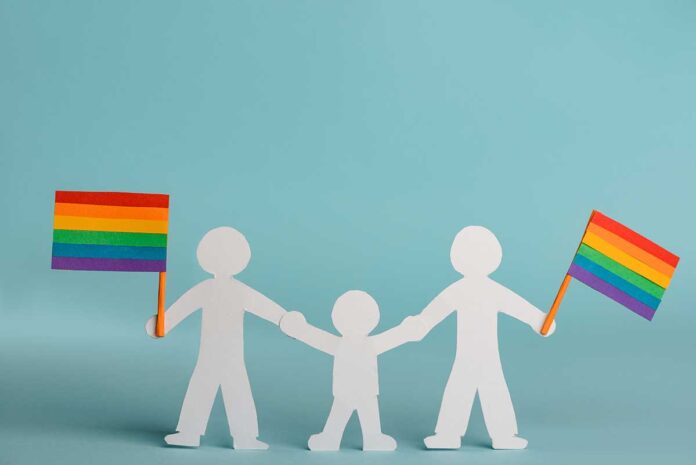The far-right Italian government of Prime Minister Georgia Meloni is taking parental rights from queer parents and putting their children at risk — but in more than a dozen European cities over seven countries, queer parents and their allies have been rallying in protest.
Same-sex couples in Italy cannot marry or access assisted reproduction, including surrogacy, which is illegal for anyone. Adoption is also technically forbidden to them, but a vagueness of the laws has meant that some jurisdictions, since 2014, have allowed non-gestational parents in same-sex couples to adopt child(ren) born to their partners after the couples have gone abroad to start their families.
After taking power last fall, however, Meloni’s government forbade the creation of Italian birth certificates with two mothers and the recognition of foreign birth certificates with two fathers. In mid-July, central government officials in Padua went further, and informed 27 families with two moms, raising 33 children, that the non-gestational parent is being removed from their child(ren)’s existing birth certificate(s).
The EuroCentralAsian Lesbian* Community (EL*C), a network of hundreds of organizational and individual members, issued an open letter to Meloni last week, explaining that the government’s actions “will have major impacts” on the everyday life of children in these families. “Their mom cannot pick them up at school, they might not be able to do educational activities and they will not be able to travel. Their right to healthcare will be in danger, as only one parent will be able to authorize medical procedures (from the flu shot to urgent life-saving procedures),” EL*C said.
One impacted couple, Vanessa Finesso and Cristina Zambon, had their child via reciprocal IVF using Zambon’s egg, carried in Finesso’s uterus, but Zambon is still being removed from the birth certificate despite being the child’s genetic parent. To make things worse, the couple told the U.K.’s Daily Mail, Finesso has cancer; if she dies, Zambon will have no rights to their child. In other cases, the parent being stripped of rights has neither genetic nor gestational ties, but nevertheless planned for and is raising the child(ren) jointly with her partner.
Famiglie Arcobaleno (Rainbow Families), the country’s largest organization for LGBTQ+ parents, said in a statement that the Meloni government’s actions were “removing a legal parent from minors even six years after birth: a shameful act unworthy of a civilized country.”
In another statement, they called the government’s moves “a violent and overbearing action against our children who risk being suddenly deprived of their family identity and of any legal protection by the intentional parent.”
EL*C called on its members to demonstrate at Italian embassies and consulates, and such protests have taken place so far in Belgium (Brussels), France (Bordeaux, Lyon, Marseilles, Nice, Paris), Germany (Berlin, Cologne), Portugal (Lisbon, Porto), Spain (Alicante), the U.K. (Dublin, London), and at the Vatican. More may be forthcoming.
The organization is also encouraging people to print their open letter (at lesbiangenius.org, “Lesbians March on Italian Embassies!”) and send it to the Italian embassy or consulate near them. (The Italian Embassy in Washington D.C. is at 3000 Whitehaven Street NW, Washington, DC 20008, and its e-mail address is [email protected].)
Queer families are under attack in Italy in other ways as well. The lower house of the Italian Parliament, the Chamber of Deputies, voted in late July to go beyond simply outlawing surrogacy within Italy and to declare it a “universal crime,” penalizing Italian citizens with up to two years in prison and fines of up to one million euros if they go abroad for surrogacy, even to places where it is legal. The Senate will vote on the bill this fall.
While the U.S. has not seen a mass removal of parentage rights as in Padua, several trial courts, including ones in Oklahoma and Pennsylvania, have recently removed non-gestational mothers from their children’s birth certificates in individual cases. And if the U.S. Supreme Court overturns the right to marriage equality, as Justice Clarence Thomas has hinted could happen, non-gestational LGBTQ+ parents in even more states could face further difficulties securing their parentage.
Even now, as a recent report from the Movement Advancement Project (MAP) has shown, LGBTQ+ parents, married and not, are subject to a “patchwork” of parentage laws across the United States that often leave their children vulnerable, without secure legal ties to one or more of their parents.
Some states, such as Rhode Island, Connecticut and Colorado, have recently modernized their laws to clarify and simplify paths to parentage for all families today, while others continue to make it difficult for LGBTQ+ families and others formed via assisted reproduction to secure their family’s legal ties. (See “LGBTQ Paths to Parentage Security,” at lgbtqparentage.org, for a guide that GLBTQ Legal Advocates & Defenders (GLAD) and I developed to help LGBTQ+ parents and prospective parents understand current options for legally protecting our families.)
We should therefore stand in solidarity with the queer-parent families in Italy, even as we push for laws that better protect children of LGBTQ+ families in the U.S. In our connected global world, we can do no less.
